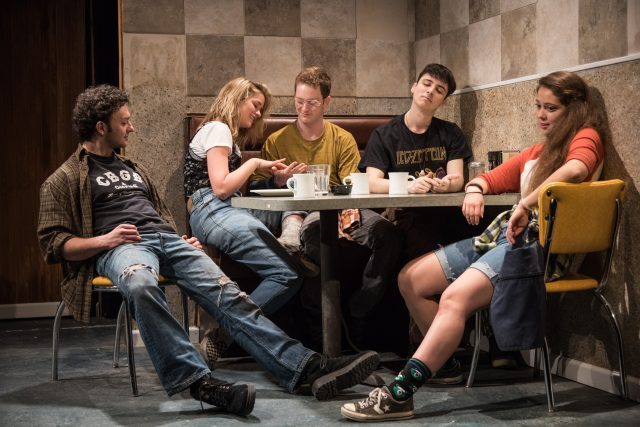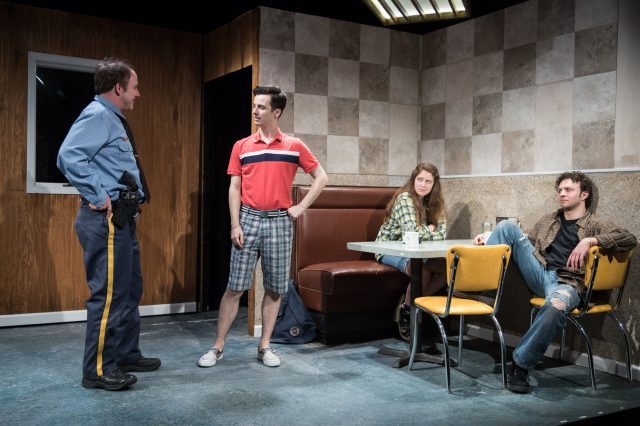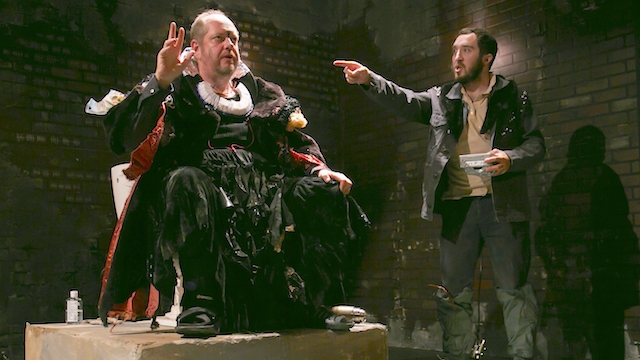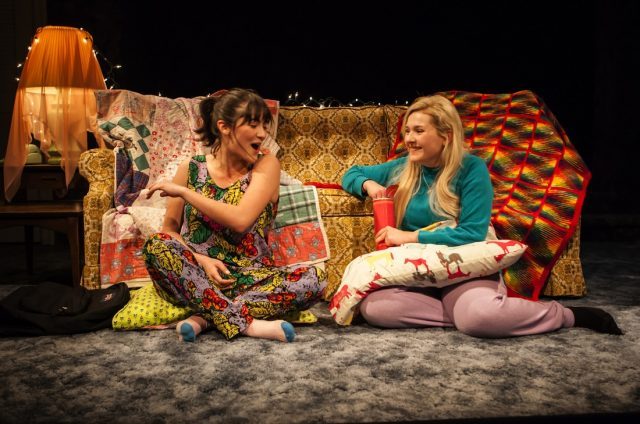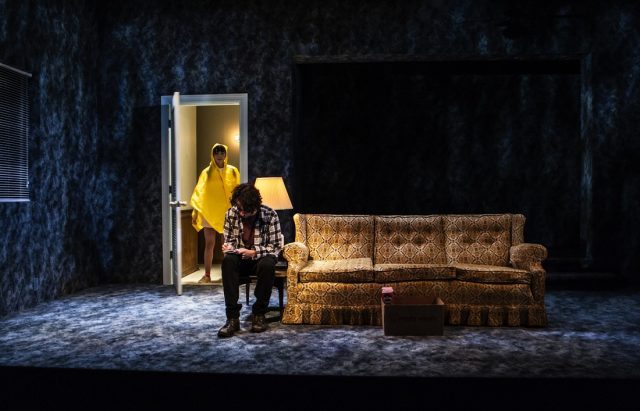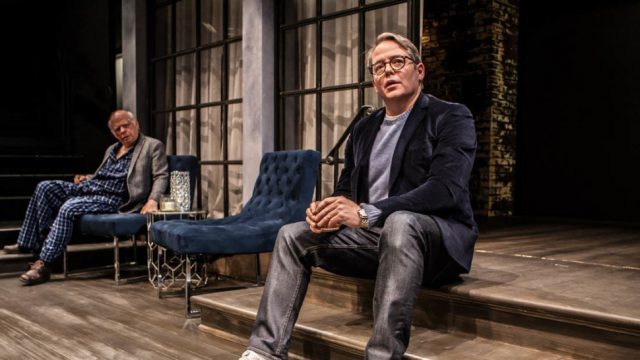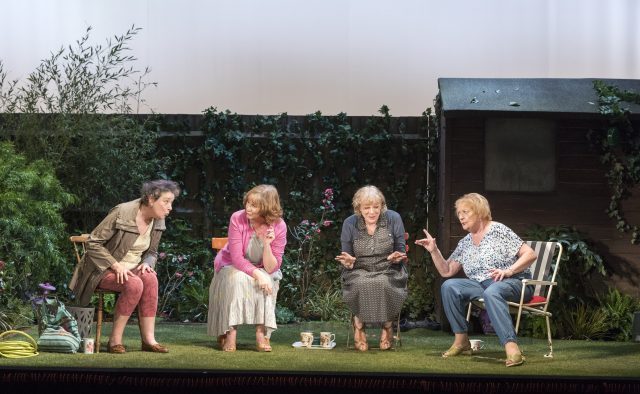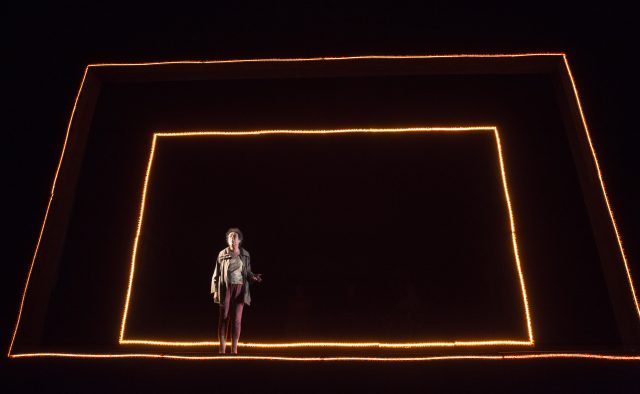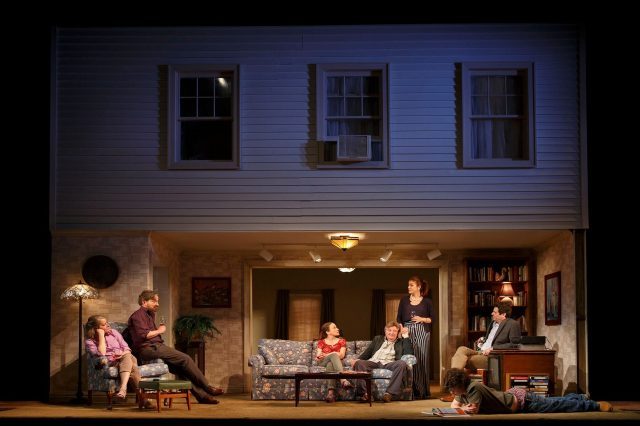
The Fischer family face more than they bargained for in Roundabout world premiere (photo by Joan Marcus, 2017)
Laura Pels Theatre
Harold and Miriam Steinberg Center for Theatre
111 West 46th St. between Sixth & Seventh Aves.
Tuesday – Sunday through April 30, $89
212-719-1300
www.roundabouttheatre.org
Right before seeing Steven Levenson’s If I Forget at the Laura Pels Theatre, I watched Ferne Pearlstein’s excellent The Last Laugh, a documentary about the appropriateness of jokes regarding Nazis and the Holocaust. Little did I know that Levenson’s stirring black comedy shatters boundaries by having one of its protagonists suggest that Jews should finally put the Holocaust behind them and move on. At one point, as much of the audience, including me, laughed at a religious-tinged joke, the woman seated to my left looked around and said, “That’s just not funny.” In the superb Roundabout world premiere, Jeremy Shamos is dazzling as cynical elitist Michael Fischer, a Jewish Studies professor who has been recommended for tenure; he is also writing a controversial book about Jewish history and heritage. It’s July 2000, and he and his non-Jewish wife, Ellen (Tasha Lawrence), a social worker, have just moved to Park Slope; their nineteen-year-old daughter, Abby, is on a birthright trip to the Holy Land. “I guess, I just still don’t really understand why we had to send our daughter to Israel in the most — the worst time to be in the Middle East in the last twenty-five years,” a rattled Michael says to Ellen. The Fischer family — Michael and Ellen; Michael’s younger sisters, Sharon (Maria Dizzia) and Holly (Kate Walsh); Holly’s second husband, the McCain-loving Howard (Gary Wilmes); and Holly’s son from her first marriage, teenage schlub Joey (Seth Michael Steinberg) — has gathered at the Washington, DC, home of patriarch Lou (Larry Bryggman) to celebrate the old man’s seventy-fifth birthday. Lou hasn’t been the same since the recent death of his wife, who needed special care, leading to arguments and estrangement among the siblings, with Sharon doing the vast majority of the daily, difficult work and Michael mostly staying away. “I’m not good in that sort of . . . I didn’t want to see her like that,” Michael says. “No one wanted to see her like that. We still did, though,” Sharon responds. Meanwhile, Holly has dreams of turning the family legacy, a property owned by Lou that for years has been operated as a bargain store by a Guatemalan family that pays below-market rent, into an interior decorating business for herself, but Sharon does not want to kick out Rodrigo and his clan, for more than one reason.
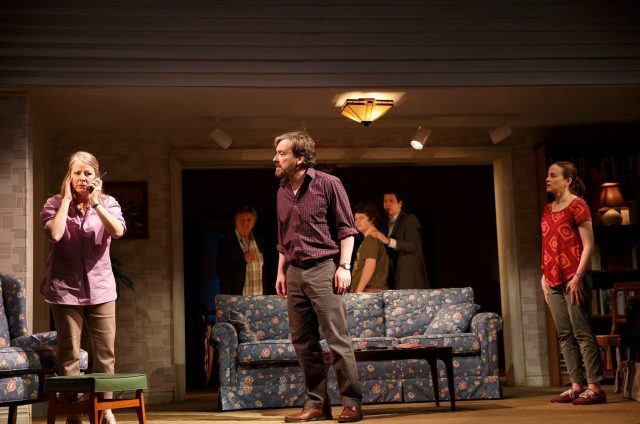
The Fischers get some bad news in Steven Levenon’s IF I FORGET (photo by Joan Marcus, 2017)
If I Forget is in some ways the Jewish version of Stephen Karam’s The Humans, which was also staged at the Laura Pels (before moving to Broadway) and also features a tear-away two-floor set, although in this case Derek McLane’s rotates to reveal another side. Levenson (Dear Evan Hansen, The Unavoidable Disappearance of Tom Durnin) takes sharp aim at faith and religion in the twenty-first century with insightful dialogue that incites both the characters and the audience. “The things he says sometimes,” Holly tells Ellen, referring to Michael. “If I didn’t know him, honest to God, if I heard him on the street, I would think he was an anti-Semite. Honest to God.” When Michael, an avowed atheist, finds out that Abby is rediscovering her Jewish roots, he gets into a philosophical argument with Holly.
Michael: Why is everyone, why are we excited about this?
Holly: It’s wonderful. It’s keeping the tradition alive.
Michael: Which tradition, exactly?
Holly (to Ellen): He has to contradict everything.
Michael: It’s not her tradition. It’s not, our grandparents, Mom’s parents, do you think they spoke Hebrew? They didn’t even go to temple. They were educated people. They were enlightened, cosmopolitan people. Now everyone is suddenly, I don’t know what happened. What happened? Everybody’s religious now?
Holly: So what?
Michael: The head of my department — and this is a smart guy, this is not, this is a world-renowned scholar — he grew up like us: cheeseburgers, sweet and sour shrimp, Christmas trees — remember, we had that Christmas tree?
Holly: I love Christmas trees.
Michael: Now, his whole family, they’re shomer shabbos, they’re walking to synagogue on Saturday mornings.
Holly: Why does that upset you?
Michael: Because we spent the entire twentieth century trying to get away from that. And now you look around and everybody on the Upper West Side is reading books on Kabbalah and kosher sex, whatever the hell that is, and it’s just, what happened to the last hundred years?
Didn’t we already have this conversation? Didn’t we decide we were done with, you know, spirits in the sky?
Ellen: I think you could be a little more tolerant of other people’s beliefs.
Obie winner and Tony nominee Shamos (Engaged, Clybourne Park) is scintillating as Michael, all pent-up energy and intense nervousness, so sure he’s always right and quick to exploit others’ flaws; it’s one of those performances you can’t take your eyes off of, never knowing what he will say or do next. No matter how insensitive Michael gets, and he reaches some epic proportions, you still can’t help but root for him as he seeks tenure, tries to protect his daughter, and genuinely wants to do what’s best for the family. The entire cast is outstanding, from two-time Tony nominee Bryggman’s fading Lou — who delivers a captivating story about liberating Dachau at the end of WWII — to high school junior Seth Michael Steinberg’s Joey, a teenager who thinks he’s immune from the adults’ many problems. Walsh (Private Practice, Dusk Rings a Bell) and Dizzia (Belleville, In the Next Room [or the Vibrator Play]) make excellent foils, as the hoity Holly never misses a chance to take a shot at anyone and everyone while the steadfast Sharon plays martyr. Lawrence (The Whale, Proof) and Wilmes (Chinglish, Isolde) are both solid as the once-dependable in-laws who start showing cracks themselves. Shakespeare in the Park regular Daniel Sullivan (Prelude to a Kiss, Intimate Apparel) directs with a steady hand, maintaining a controlled chaos that could explode at any moment. Levenson has written a finely honed portrait of an American family coming apart at the seams as they examine the past and fear the future, with religion serving as the trigger. “Obviously you hate where you come from, you hate the culture that you come from,” Sharon tells Michael. They’re not exactly enamored with where they’re going either. Balancing humor and pathos, If I Forget — the title references both the phrase “Never Forget,” which Jews say about the Holocaust, as well as Alzheimer’s disease and personal and collective memory, is a powerful, very human play that captures the zeitgeist of Jewish life in the modern era, especially in a time when anti-Semitic hate crimes and mixed marriages are on the rise, religion drives so much political discourse, and the number of Holocaust survivors keep dwindling.
